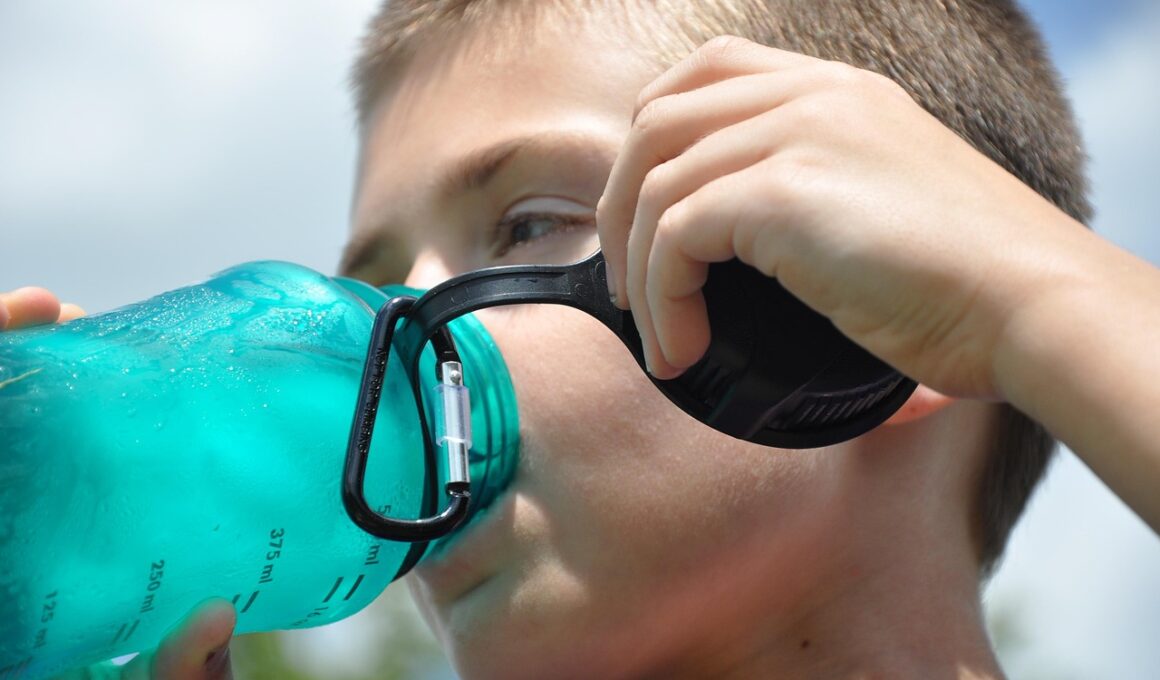Best Hydration Practices to Prevent Digestive Issues in Endurance Sports
Endurance sports demand not only physical strength but also a keen understanding of hydration. Maintaining appropriate fluid levels is essential for optimal performance, particularly regarding digestion. During prolonged exercise, the body tends to divert blood flow away from the digestive system to support muscle function. This can lead to gastrointestinal discomfort, cramping, and other digestive issues. To mitigate these problems, athletes should incorporate effective hydration strategies tailored to their individual needs. Planning hydration during training sessions allows one to identify precisely how much fluid is required without overwhelming the stomach. Consider methods of measuring fluid intake over long training periods to establish a routine that will be effective during competitions. Hydration is more than just drinking water; electrolyte balance must also be maintained. Consuming a well-rounded array of fluids enriched with electrolytes can balance hydration and digestion, ultimately enabling athletes to train longer and perform better in endurance events. Monitoring urinary output color can be an invaluable indicator of hydration status, prompting timely adjustments as needed. Training successfully while focusing on hydration will yield improved performance in various endurance sports.
Understanding the science behind hydration can provide endurance athletes with the tools to enhance their performance. Water absorption rates can significantly impact digestive function during exercise. Consuming excessive amounts of plain water can lead to dilution of electrolytes and might exacerbate digestive issues. Instead, athletes are encouraged to mix water with sports drinks or electrolyte tablets to optimize hydration during intense activities. Strategies should consider not only what to drink but also when to drink it. Sipping small amounts of fluid regularly throughout training can help maintain hydration without overloading the stomach. Pre-exercise hydration is key; athletes should focus on being well-hydrated before engaging in their activity. This allows for better absorption rates during the exercise. Additionally, mid-exercise hydration becomes vital, especially during long events. Developing a personalized hydration plan by experimenting with various drinks and timings can lead to optimal results. Timing of carbohydrate intake—working synergistically with hydration—can prevent gastrointestinal problems often experienced during races. Careful management of hydration can yield significant benefits for athletes in preventing digestive issues while participating in endurance sports.
Types of Hydration Solutions
When it comes to hydration options, endurance athletes have several choices to consider. Pure water, while essential, may not provide sufficient hydration by itself during endurance events. Sports beverages, often flavored and infused with electrolytes, can offer a balanced approach to rehydration and electrolyte replenishment. Various formulations are available, specifically designed to cater to the varying needs of athletes during competition or training. Options include isotonic, hypotonic, and hypertonic fluids. Isotonic fluids are effective as they deliver both hydration and energy through carbohydrates. Hypotonic solutions are ideal for rapid absorption and replenishing lost fluids after sweat. Hypertonic drinks provide energy but need to be combined with water for effective hydration. Moreover, homemade options like natural fruit juices diluted with water can also serve as healthier, more personalized alternatives. Some athletes may also benefit from consuming gels or chews along with their liquids to optimize both hydration and energy levels. Awareness of the various hydration solutions available and their specific uses can aid in formulating an effective hydration strategy tailored to individual needs in endurance sports.
In addition to selecting the right fluids, endurance athletes should not overlook the significance of food choices related to hydration. Nutrient-dense meals, rich in electrolytes like potassium and sodium, can support optimal hydration. Consuming fruits and vegetables such as watermelon, cucumbers, and oranges helps contribute to overall fluid intake while providing vitamins and minerals. Establishing a well-balanced pre-competition meal plan can foster hydration levels that minimize digestion difficulties during events. Foods high in fiber can help maintain intestinal regularity; however, athletes must be cautious to avoid excessive fiber intake immediately before an event, as it can lead to discomfort. For optimal results, meals should be consumed at least two to three hours prior to endurance events. Small snacks such as bananas or trail mix can be beneficial closer to the event. Staying attentive to dietary habits can foster better hydration practices, ensuring athletes are in the best possible condition for performance. Ensuring these considerations are part of a training regimen is essential for refining hydration strategies that enhance athletic endurance and digestive comfort.
Hydration and Recovery
A significant aspect of hydration is understanding its critical role in recovery. Post-exercise hydration aids in reestablishing fluid balance and promoting digestion, which is frequently compromised during prolonged endurance efforts. Drinking fluids containing electrolytes after finishing an event can expedite recovery and rebuild muscle function. Timing is key; athletes should aim to hydrate shortly after finishing for maximum benefits. Monitoring hydration status through urine color can indicate when to focus on this vital recovery component. Additionally, incorporating protein in post-exercise meals or beverages can support muscle repair while enhancing hydration. Many athletes find that ingested liquids, such as protein shakes or smoothies, effectively meet both protein and rehydration needs. Recovering from endurance sports involves not solely physical replenishment but also proper nutritional intake to facilitate digestive processes after intense activity. Athletes are reminded to treat recovery hydration as equally important as hydration during activity. Having measures in place to ensure ongoing hydration post-exercise can significantly impact overall performance, readiness for future sessions, and long-term health across various endurance sports.
As athletes divulge into their hydration practices, it’s crucial to experiment and analyze individual needs. Factors such as body weight, climate, and exercise intensity impact hydration requirements significantly. Taking the time to develop personalized hydration strategies can pay dividends in performance and overall health. Regular hydration testing in varying conditions during training ensures athletes adapt efficiently to diverse environments. Implementing a sustained approach that incorporates feedback from training can lead to more effective hydration strategies. Hydration strategies should not be static; they must evolve alongside changing workout patterns and seasonal conditions. Collaborating with nutritionists or coaches can provide further insights and ensure tailored plans address specific hydration needs. Athletes are also encouraged to listen to their bodies, taking cues from fatigue levels, thirst, and digestive comfort. Building hydration awareness into daily routines creates a foundation for lasting strategies that optimize performance consistency. Attention to hydration practices becomes exceptionally crucial during the lead-up to competitions when training demands escalate. Thus, ensuring a well-rounded approach to hydration nurtures overall success in endurance sports.
Conclusion
Ultimately, effective hydration strategies can make a significant difference in preventing digestive issues during endurance sports. Athletes must recognize that optimal hydration encompasses more than merely drinking fluids; it involves understanding individual needs, food choices, timing, and recovery practices. By taking a comprehensive approach that integrates all aspects of hydration, endurance athletes can enhance their performance and wellbeing. Establishing a personalized hydration plan can mitigate negative feelings associated with improper hydration during racing or training. Experienced athletes often share valuable insights about their hydration experiences, which serve as a guide for newcomers in the endurance sports community. Engaging with this vital aspect of sports preparation can boost confidence levels in both training and competition. Planning strategies for hydration around workouts can lead to well-executed performances and a reduction in common digestive issues. By embracing the knowledge of effective hydration practices and fostering an atmosphere of education and sharing within the endurance community, athletes can work towards achieving their fullest potential. In summary, proper hydration remains an essential pillar of athletic success, significantly contributing to overall performance during endurance events.


